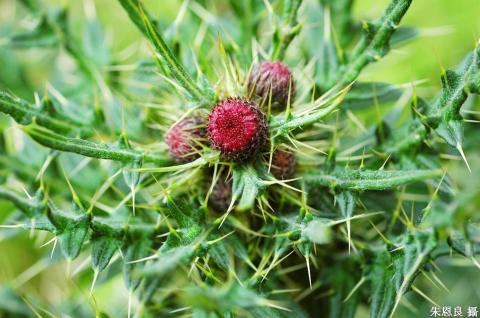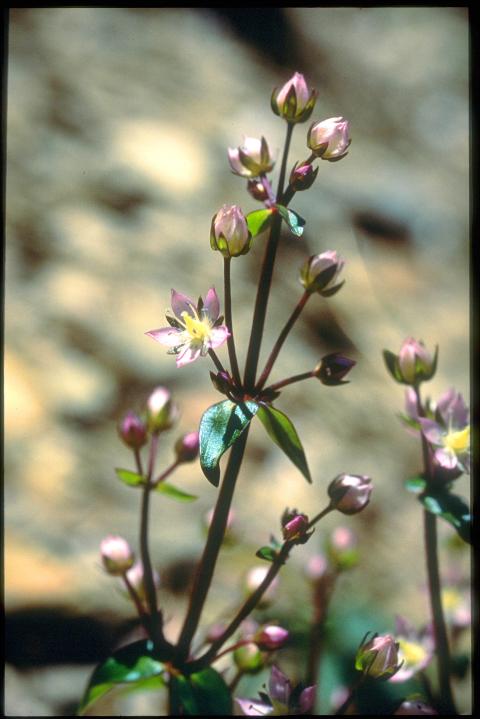At an international conference on Sept. 26, Academia Sinica academician Chou Chang-hung said that with the onset of global warming, wild plant species at average to high altitudes have been showing a tendency to migrate to higher altitudes, adding that if these species continue to migrate they will eventually reach a point where there is nowhere to grow. Chou says that six plant species indigenous to Taiwan, including Yushan’s Hypericum nagasawai, will soon face extinction, and says that the preservation of genetic resources brooks no delay.
The Taiwan Endemic Species Research Institute (TESRI) under the Council of Agriculture held the International Conference on the Collection and Preservation of Plant Genetic Resources on Sept. 26, with Peter H. Raven, a former science consultant for the Clinton administration and longtime director of the Missouri Botanical Garden, around a dozen other international experts from South Africa, England, Germany and China, as well as Academia Sinica’s Chou, Lee Chia-wei, a professor in National Ching Hua University’s Department of Life Sciences, and Chiu Chi-jung and Chung Kuo-fang, both professors in National Taiwan University’s School of Forestry and Resource Conservation, presenting papers at the conference.
Chou says research shows that from 1906 to 2006 plant life at average to high altitudes in the Hehuanshan area gradually migrated to higher altitudes due to global warming, averaging 3.6m per year. If this migration trend is not slowed down, there will eventually be no more land available for the plants to grow, meaning that at least six of Taiwan’s native plant species — Anaphalis morrisonicola, Artemisia morrisonensis, Swertia randaiensis, Hypericum nagasawai, Angelica morrisonicola, and Cirsium arisanensis — potentially face extinction.

Photo courtesy of the Endemic Species Research Institute
照片由特有生物研究保育中心提供
TESRI director Tang Hsiao-yu says that they are currently in the process of planning facilities for the preservation of plant species in high-altitude mountain areas. Still at the preliminary phase of planning, they have decided to create a preservation area at Hehuanshan and will be working to collect and preserve 500 or so of the plant genetic resources currently growing at high altitudes there. With enough manpower and funding, the institute hopes to expand its collection and preservation endeavors to Southeast Asia in the future, potentially benefiting their work by holding exchanges with international experts and learning from the experiences of others, Tang says.
(Liberty Times, Translated by Kyle Jeffcoat)
全球氣候暖化,中高海拔野生植物出現往高海拔地區遷移生長的趨勢,中研院院士周昌弘九月二十六日在一場國際研討會中提出警訊,強調若高山植物持續往高處遷移,未來將無處可去,而台灣特有種的玉山金絲桃等六種植物恐將絕滅,種原蒐藏保育已刻不容緩。

Photo courtesy of the Endemic Species Research Institute
照片由特有生物研究保育中心提供
農委會特有生物研究保育中心二十六日舉辦植物種原蒐集與保育國際研討會,包括曾任美國前總統柯林頓科學顧問的密蘇里植物園園長彼得‧雷文與來自南非、英國、德國與中國等十二名國際專家學者與中研院院士周昌弘、清大生命科學系教授李家維與台大森林資源系教授邱圻榮、鍾國芳均與會發表報告。
周昌弘指出,從一九○六至二○○六年之間在氣候暖化影響下,研究紀錄顯示在合歡山區的中高海拔野生植物,每年以三點六公尺速率往高海拔遷移生長,若此趨勢未見減緩,最後將無處可去,其中至少有玉山抱莖籟簫、細葉山艾、巒大當藥、玉山金絲桃、玉山當歸與阿里山薊等六種植物極可能面臨絕滅。
特生中心主任湯曉虞表示,目前正積極籌設高山植物種原保存設施,初步選定合歡山地區設立保存場地,就現有五百多種高山植物種原進行蒐藏保存,未來若人力、財力允許更將擴展蒐藏範圍至東南亞地區,藉著國外學者專家的經驗交流,有助推動種原保存工作。
(自由時報記者陳信仁)

Nestled in the mountain region of northern Taiwan lies a small village that was once bustling due to a thriving coal industry, only to later gain fame for an entirely different reason — cats. This is Houtong Cat Village (猴硐貓村), located in Ruifang District, New Taipei City. Traditional Coal Mining and Village Transformation Houtong was originally known as “Monkey Cave” (houtong, 猴洞), a name derived from the wild monkeys that once inhabited caves in the surrounding hills. During the Japanese colonial period in the early 20th century, rich coal deposits were discovered and developed, rapidly turning Houtong into one of northern Taiwan’s

Beatboxing is the art of making drum sounds using nothing but your mouth, lips, tongue, and voice. This incredible skill turns your voice into a personal drum kit, allowing you to create beats and rhythms that sound just like those of real instruments. Born from hip-hop culture in the 1980s, beatboxing has evolved into a global form of musical expression found in various genres. What makes beatboxing so special? First, it requires no equipment at all. This accessibility allows you to develop your musical sense and rhythm skills wherever you are. Plus, beatboxing is a fantastic way to express

對話 Dialogue 清清:氣象預報說週末好像有寒流,天氣這麼冷,我只想宅在家裡。 Qīngqīng: Qìxiàng yùbào shuō zhōumò hǎoxiàng yǒu hánliú, tiānqì zhème lěng, wǒ zhǐ xiǎng zhái zài jiālǐ. 華華:說到這個,我週末想約剛認識的新朋友出去玩,但寒流來的話戶外活動可能不太合適,我還不知道要做什麼好。 Huáhua: Shuō dào zhège, wǒ zhōumò xiǎng yuē gāng rènshí de xīn péngyǒu chūqù wán, dàn hánliú lái de huà hùwài huódòng kěnéng bú tài héshì, wǒ hái bù zhīdào yào zuò shénme hǎo. 清清:要不要考慮去玩密室脫逃?我以前跟朋友去過,很好玩,而且不怕風吹雨淋。 Qīngqīng: Yào bú yào kǎolǜ qù wán mìshì tuōtáo? Wǒ yǐqián gēn péngyǒu qù guò, hěn hǎowán, érqiě bú pà fēng chuī yǔ lín. 華華:我覺得不錯,可是我們才剛認識,會不會太尷尬? Huáhua: Wǒ juéde búcuò, kěshì wǒmen cái gāng rènshí, huì bú huì tài gāngà? 清清:不會啦!玩密室脫逃需要大家一起合作,反而更容易變熟。 Qīngqīng: Bú huì la! Wán mìshì tuōtáo xūyào dàjiā yìqǐ hézuò, fǎn’ér gèng róngyì

Continued from yesterday(延續自昨日) https://www.taipeitimes.com/News/lang Microexpressions appear quickly and can disappear in the blink of an eye. They typically last only a fraction of a second, yet they reveal a person’s true emotions. Here’s how to recognize the seven microexpressions. Happiness: The corners of the lips move upward and back, lifting the cheeks. Crow’s feet also form near the outside of the eyes. Sadness: The corners of the mouth turn downward, creating a frown. The eyebrows may also draw closer together. Disgust: The muscles around the nose and eyebrows tighten toward the bridge of the nose. The upper lip rises slightly to reveal the teeth. Surprise: